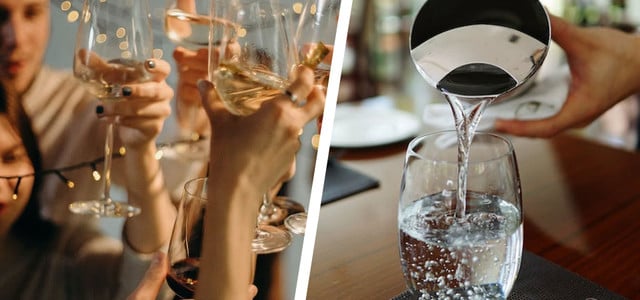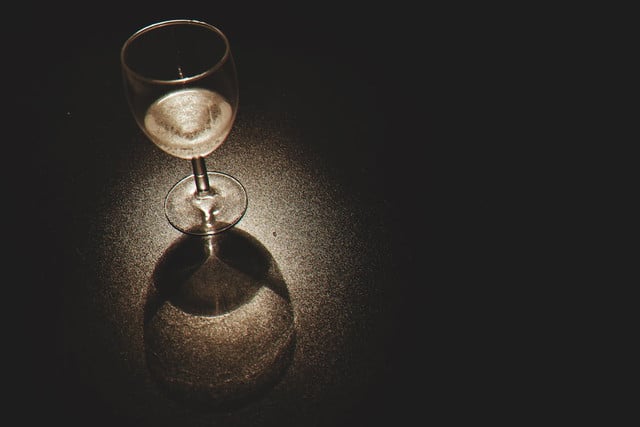
An after-work beer here, a glass of champagne to toast there: alcohol has a firm place in our society – although it is by no means healthy. Utopia shows the health risks associated with alcohol consumption and how you can manage to drink less alcohol.
It’s one of the most popular resolutions every year: drinking less alcohol. Many people consciously go on a radical month-long withdrawal, but by Carnival at the latest, many are drinking too much. We have tried and tested tips on how you can manage to drink less alcohol all year round.
Drinking alcohol: a toxic part of our society
Alcohol is hard to imagine everyday life without: people meet up for a beer after work, toast a birthday with champagne or drink a glass of red wine with dinner. For many people, parties and alcohol also go hand in hand. Alcohol consumption is correspondingly high in Germany; people aged 15 and over drink around ten liters of pure alcohol per capita in this country per year (source: DHS).
The problem: We often associate alcohol with socializing, consider consumption to be normal – and cannot imagine celebrations without alcohol, for example. But that should not obscure the fact that alcohol is a drug that can be addictive.
The German Centre for Addiction Issues (DHS) states that alcohol consumption is always risky. Even small amounts can impair concentration and reaction time. According to the DHS, alcohol consumption can also cause various health problems, such as liver, pancreas, heart, central and peripheral nervous system and muscle diseases. Alcohol can also cause cancer. At the same time, there is no potentially health-promoting or safe level of alcohol consumption.
Experts therefore advise drinking as little or no alcohol as possible. For a long time, the DHS recommended that adults not exceed the following amounts on a long-term basis in order to avoid the risk of illness:
-
Women: twelve grams of pure alcohol daily
-
Men: 24 grams of pure alcohol daily
To illustrate these amounts of alcohol: There are about ten grams of pure alcohol in 0.1 litres of wine or sparkling wine, 0.2 litres of beer or four centilitres (cl) of liquor. But the DHS now advises reducing alcohol consumption for the sake of health. Even small amounts promote cancer or cardiovascular disease, according to new findings. The DHS therefore advises: “Even small amounts of drinking can contribute to causing disease. […] For physical health, it is best not to drink alcohol.”
The German Nutrition Society (DGE) has also recently revised its consumption recommendations for alcohol and now advises against drinking alcohol. The DGE writes that alcohol “is a cell poison and is involved in the development of many diseases. There is no risk-free amount.”
The best tips for drinking less alcohol
We don’t want to spoil your enjoyment of a glass of wine with a good meal or a small beer on holiday. But for the sake of your health, you should limit your alcohol consumption. The following tips will help you do so.

Important note: We are addressing adults who occasionally drink alcohol and want to limit their alcohol consumption. If you are worried that you are or are becoming addicted to alcohol, you should seek professional help from a counseling center. The DHS lists contact points on its website, and aid organizations such as Caritas or the Blue Cross can also help. The Federal Center for Health Education (BZgA) also offers an information line for addiction prevention on 0221 892031.
1. Get an overview of your own alcohol consumption
First of all, it is important that you know how often and how much alcohol you drink. For a month, write down which days you drink and how many glasses you drink. It is important to also note why you drank on that occasion. You can write this down in your diary or make a note on your phone.
After the month, you will have a good overview of how many days a week you drink alcohol and can reduce the number of days step by step. If you turn to alcohol to unwind or to celebrate successes, we will give you tips below on how to replace drinks such as wine and beer in these situations.
2. Set goals for less alcohol
You can of course make a “cold start” and abstain from alcohol completely for a while. This is particularly popular at the beginning of a new year – the keyword is Dry January – or during Lent.
Our colleague tried not drinking alcohol for a month – she rarely reached her limits, but learned a lot about beer and herself. Read her experiences in the article: “Dry January”: A month without beer, wine and co. in a self-experiment
If you don’t want to give up drinking radically, set yourself other goals. These could be:
- Only drink alcohol once a week.
- Don’t drink alcohol for one week every month.
- Drink alcohol on “only” 100 of the 365 days of the year.
A firm rule can help you to reduce the amount of alcohol you drink in the long term. If you only loosely resolve to drink “less”, you will not be able to measure whether you are sticking to it.
3. Avoid alcohol in everyday life
Alcohol often flows (in abundance) on birthdays, company parties and other occasions, but people also drink regularly and unconsciously in everyday life. You can reduce this:
-
Don’t buy alcohol to take home. That way, you won’t be tempted to pour yourself a glass of wine or open a bottle of beer when you’re on the couch in the evening.
- Keyword after-work beer: Many people drink it to relax and unwind after a stressful day. Break this routine and find another way to relax: a walk, a yoga session or a podcast will clear your head.
- Is alcohol somehow part of the beer garden or bar? Simply order the non-alcoholic version and try out the large selection of non-alcoholic beers (organic ones are also available). Wine and sparkling wine are also available non-alcoholic.
-
Non-alcoholic cocktails can be a varied new experience; you can also mix so-called mocktails yourself.
- If you find water boring in the long run, throw a slice of lemon into your glass or spice up the sparkling water with mint leaves. A dash of fruit juice or syrup also tastes delicious, but usually contains a lot of sugar.
- When meeting up with friends or family, consciously suggest activities that don’t involve alcohol. For example, go on a long hike, go to an escape room, do a scavenger hunt, or cook together.
If you do want to drink alcohol, know your limits and never quench your thirst with alcohol. Remember to drink water every now and then on party nights and don’t down cocktails etc. quickly, but enjoy them slowly.
4. Celebrate successes and drink less alcohol in the long term
If you are the only one in your group of friends who doesn’t want to drink alcohol, it can be difficult, especially at first. But try to stand firm and don’t let yourself be persuaded to drink. Say clearly, “No, I don’t want to drink alcohol today.” You can learn to say no.
Explain to your friends why you want to reduce your drinking. Maybe you can get one or two people to think about it and soon you’ll have allies in staying alcohol-free.
Very important to ensure that you can keep going for a long time: If you have achieved your goal for half a year, for example, you should celebrate this success. Treat yourself to a massage, a meal in a nice restaurant or a day off just for you.
You will see that over time it will become easier to drink alcohol less often. Because your new routines, such as an after-work walk or a non-alcoholic beer, will become routine. This means that you will question them less and instead automatically incorporate them into your everyday life.
Read more on Techzle\.com:
- Detoxify the liver: These remedies cleanse the liver naturally
- Self-experiment: Sleep in every day for a month
- Finally change your habits – 5 tips to make it work
** marked with ** or orange underlined Links to sources are sometimes affiliate links: If you buy here, you are actively supporting Techzle\.com, because we then receive a small part of the sales proceeds. More information.